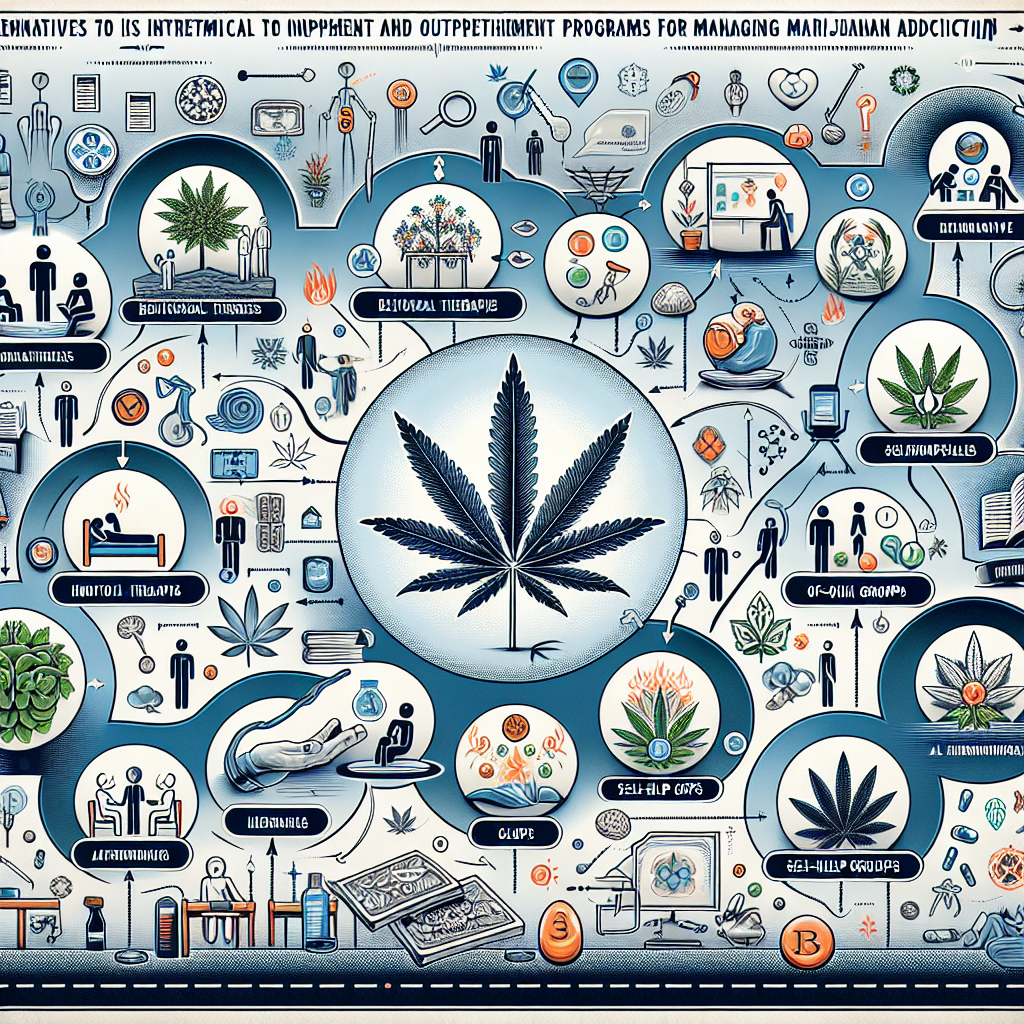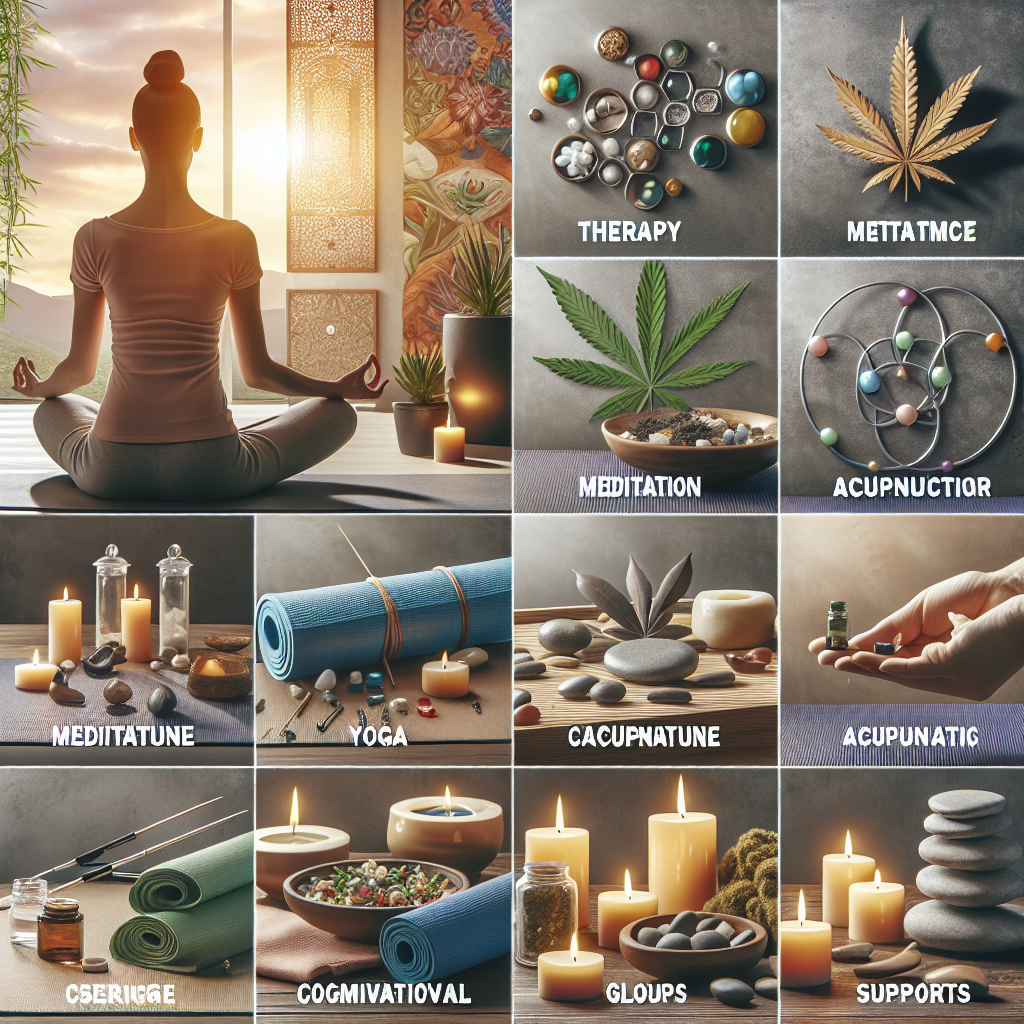-
Table of Contents

“Explore Beyond: Alternative Paths to Overcoming Marijuana Addiction”
Introduction
Marijuana addiction, also known as cannabis use disorder, is a condition that affects many individuals worldwide. While traditional inpatient and outpatient programs are commonly recommended for treatment, there are alternative approaches that can also be effective. These alternatives include holistic therapies, support groups, online counseling, and self-help strategies. Holistic therapies may involve practices such as yoga, meditation, and acupuncture, which aim to address the physical, emotional, and spiritual aspects of addiction. Support groups, such as Marijuana Anonymous, provide a community-based approach where individuals can share experiences and receive peer support. Online counseling offers the convenience of receiving professional help from the comfort of one’s home. Self-help strategies, including cognitive-behavioral techniques and mindfulness practices, empower individuals to manage their addiction independently. These alternative treatments can be tailored to meet the unique needs of each person, providing a diverse range of options for those seeking to overcome marijuana addiction.
Exploring Holistic Approaches to Marijuana Addiction Treatment
In the realm of addiction treatment, traditional inpatient and outpatient programs have long been the cornerstone for those seeking recovery from marijuana addiction. However, as our understanding of addiction evolves, so too does the array of available treatment options. Increasingly, individuals are turning to holistic approaches that address not just the physical aspects of addiction, but also the mental, emotional, and spiritual dimensions. These alternative treatments offer a comprehensive path to recovery, often appealing to those who seek a more personalized and integrative approach.
One such holistic method is mindfulness-based therapy, which emphasizes the importance of being present and fully engaged in the moment. This practice can help individuals become more aware of their cravings and triggers, allowing them to respond in healthier ways. Techniques such as meditation and yoga are often incorporated, providing tools to manage stress and anxiety, which are common underlying factors in addiction. By fostering a sense of inner peace and self-awareness, mindfulness-based therapy can be a powerful complement to more conventional treatments.
Another promising alternative is nutritional therapy, which focuses on the role of diet in overall well-being. Poor nutrition can exacerbate the symptoms of addiction and hinder the recovery process. By adopting a balanced diet rich in essential nutrients, individuals can improve their physical health, boost their mood, and enhance their cognitive function. Nutritional therapy often involves working with a dietitian to develop a personalized eating plan that supports recovery and promotes long-term health.
In addition to these approaches, exercise has been shown to be an effective tool in combating addiction. Regular physical activity can help reduce cravings, improve mood, and increase energy levels. Exercise releases endorphins, the body’s natural feel-good chemicals, which can provide a healthy alternative to the high sought through marijuana use. Whether it’s running, swimming, or practicing tai chi, finding a form of exercise that one enjoys can be a crucial component of a holistic recovery plan.
Furthermore, the role of social support cannot be overstated. Building a strong network of supportive friends and family members can provide the encouragement and accountability needed to stay on track. Support groups, both in-person and online, offer a sense of community and shared experience that can be incredibly motivating. These groups provide a safe space to share struggles and successes, fostering a sense of belonging and understanding.
Art and music therapy are also gaining recognition as valuable tools in addiction treatment. These creative outlets allow individuals to express their emotions in a non-verbal way, which can be particularly beneficial for those who find it difficult to articulate their feelings. Engaging in artistic activities can provide a sense of accomplishment and purpose, helping to fill the void left by marijuana use.
Lastly, spiritual practices such as prayer, meditation, or participation in religious or spiritual communities can offer a sense of meaning and connection that is often missing in the lives of those struggling with addiction. These practices can provide comfort, guidance, and a sense of belonging, which are essential components of a holistic recovery journey.
In conclusion, while traditional inpatient and outpatient programs remain vital resources for those battling marijuana addiction, exploring holistic approaches can offer additional pathways to recovery. By addressing the physical, mental, emotional, and spiritual aspects of addiction, these alternative treatments provide a more comprehensive and personalized approach. Embracing a holistic recovery plan can inspire hope and empower individuals to reclaim their lives, fostering a sense of balance and well-being that extends far beyond the cessation of substance use.
The Role of Support Groups and Community Resources in Overcoming Marijuana Addiction
Overcoming marijuana addiction can be a challenging journey, but it is one that many individuals successfully navigate with the right support and resources. While inpatient and outpatient programs are well-known and effective methods for treating marijuana addiction, there are alternative treatments that can play a crucial role in the recovery process. Among these alternatives, support groups and community resources stand out as vital components that can significantly enhance an individual’s ability to overcome addiction.
Support groups offer a unique environment where individuals struggling with marijuana addiction can connect with others who share similar experiences. These groups provide a sense of community and understanding that can be incredibly empowering. By participating in support groups, individuals can share their stories, challenges, and successes, which fosters a sense of camaraderie and mutual support. This shared experience can be particularly beneficial for those who may feel isolated or misunderstood in their struggle with addiction.
One of the most well-known support groups is Marijuana Anonymous (MA), which follows a 12-step program similar to that of Alcoholics Anonymous (AA). MA meetings provide a safe and non-judgmental space for individuals to discuss their addiction and work through the steps of recovery. The structure of the 12-step program encourages personal reflection, accountability, and the development of coping strategies, all of which are essential for long-term recovery. Additionally, the sense of belonging and acceptance found in these meetings can be a powerful motivator for individuals to stay committed to their recovery journey.
In addition to support groups, community resources play a significant role in helping individuals overcome marijuana addiction. Many communities offer a variety of resources, such as counseling services, educational programs, and recreational activities, all of which can support recovery efforts. Counseling services, for instance, provide professional guidance and therapeutic interventions that can address the underlying issues contributing to addiction. Through individual or group therapy, individuals can gain insights into their behavior, develop healthier coping mechanisms, and build a strong foundation for recovery.
Educational programs are another valuable community resource that can aid in overcoming marijuana addiction. These programs often focus on increasing awareness about the effects of marijuana use, the risks associated with addiction, and the benefits of living a substance-free life. By providing accurate information and practical tools, educational programs empower individuals to make informed decisions about their health and well-being. Furthermore, these programs can help dispel myths and misconceptions about marijuana use, which can be a crucial step in changing attitudes and behaviors.
Recreational activities offered by community centers or organizations can also play a pivotal role in the recovery process. Engaging in physical activities, hobbies, or social events can provide a healthy outlet for stress and emotions, reducing the likelihood of relapse. These activities also offer opportunities for individuals to build new social connections and develop a sense of purpose and fulfillment outside of substance use.
In conclusion, while inpatient and outpatient programs are effective treatments for marijuana addiction, support groups and community resources offer valuable alternatives that can enhance the recovery process. By fostering a sense of community, providing professional guidance, and offering educational and recreational opportunities, these resources can empower individuals to overcome addiction and build a healthier, more fulfilling life. The journey to recovery may be challenging, but with the right support and resources, it is entirely possible to achieve lasting change and personal growth.
Q&A
1. **Question:** Are there alternative treatments to inpatient and outpatient programs for marijuana addiction?
**Answer:** Yes, alternative treatments for marijuana addiction include cognitive-behavioral therapy (CBT), motivational enhancement therapy (MET), and support groups such as Marijuana Anonymous (MA).
2. **Question:** Can holistic approaches be used as alternative treatments for marijuana addiction?
**Answer:** Yes, holistic approaches such as mindfulness meditation, yoga, acupuncture, and nutritional therapy can be used as alternative treatments for marijuana addiction.
Conclusion
Yes, there are alternative treatments to inpatient and outpatient programs for marijuana addiction. These include cognitive-behavioral therapy (CBT), motivational enhancement therapy (MET), contingency management, support groups like Marijuana Anonymous, online therapy platforms, and holistic approaches such as mindfulness meditation, yoga, and exercise programs. These alternatives can be effective depending on the individual’s needs and circumstances.



